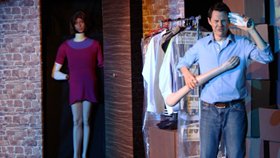Stage a musical in a pub – Break for the Border, at that – and you immediately blur your audiences' expectations. It’s easier to ‘see things differently,’ as the Absolut slogan commands, with a drink at hand. Stage a musical about Irish Eurovision entries in the weeks leading up to the Oslo final, and a dedicated fan base will readily fill the seats. Happy just to hear their favourite numbers from yesteryear, a plot, a set and live performers are all a bonus.
 In a charity shop, somewhere in Dublin, assistants Linda (Fitzpatrick) and Martin (O’Sullivan) bemoan their friend Logan’s (Kinahan) broken heart. The discovery of a dusty book of spells is met with great excitement, and in a bid to pull their pal from his misery, the pair incant a few choice verses that bring a mannequin – Manny Quinn (Kavanagh) – to life. Although not the desired outcome, Logan isn’t disappointed, and he quickly falls head over heels. It’s no surprise that the course of mannequin-love doesn’t run smoothly, and when his plastic fantastic is called back to her birth planet Sheeba, Logan is compelled to follow and save her life and their love.
In a charity shop, somewhere in Dublin, assistants Linda (Fitzpatrick) and Martin (O’Sullivan) bemoan their friend Logan’s (Kinahan) broken heart. The discovery of a dusty book of spells is met with great excitement, and in a bid to pull their pal from his misery, the pair incant a few choice verses that bring a mannequin – Manny Quinn (Kavanagh) – to life. Although not the desired outcome, Logan isn’t disappointed, and he quickly falls head over heels. It’s no surprise that the course of mannequin-love doesn’t run smoothly, and when his plastic fantastic is called back to her birth planet Sheeba, Logan is compelled to follow and save her life and their love.
There’s an obvious nod to the 1987 film, Mannequin, although the plot’s main purpose is to stretch as far as is necessary to link the songs. Twenty in total are performed, and the cast sing well, notably Fitzpatrick and Kavanagh. Some tunes register especially well with the audience such as 'Terminal 3' and 'In Your Eyes', but it’s 'Why Me?' that raises the cheers and whistles.
Although the performers don’t encourage as much interaction as they might, the pantomimic potential is there. It’s explored more obviously towards the end of the show in a relatively lengthy section devoted to a discussion of marriage. “Surely a mannequin and a human couldn’t marry,” the leader of Sheeba (Fitpatrick) proposes. “We would have to call it partnership.” This raises plenty of hisses from the audience, and marriage wins out in the end, and the pair are set to return to Earth.
Given the conclusion, it’s perhaps no surprise that the musical is devoting its proceeds to MARRIAGEQUALITY, an organisation dedicated to attaining marriage rights for gay and lesbian couples. Once the offical performance has concluded, the cast invite spectators to have a wedding photo taken on the way out, while making a €10 donation to the organisation. On one level, this sudden focus seems to redirect the light-hearted thrust of the performance, but on another an explicit bridging of performance and politics is a welcome addition to both of the gay theatre programmes. If Michael Collins and the menopause can be turned into musicals, you can certainly see how the Eurovision song contest and gay marriage could have a future.
Fintan Walsh is a post-doctoral researcher at the School of Drama, Trinity College Dublin. He is ITM’s staff writer.